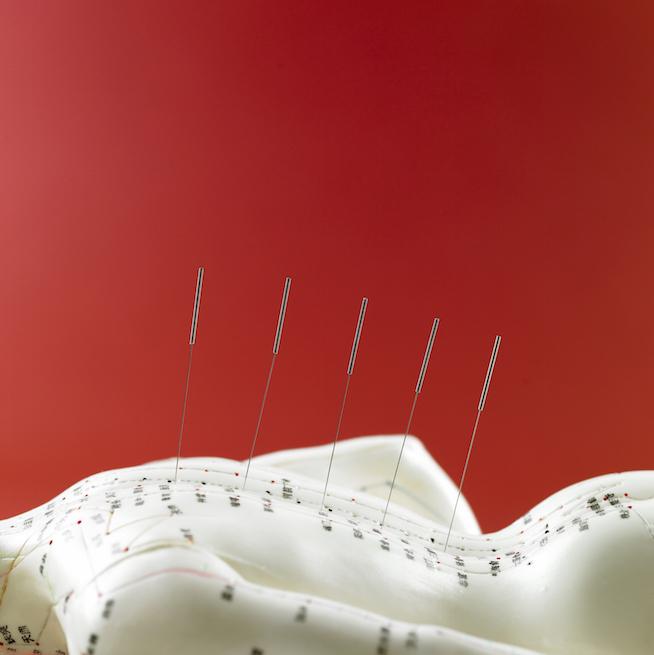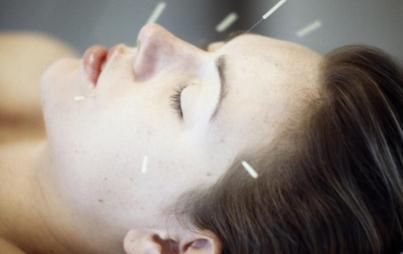
Contrary to what you may think, acupuncture isn’t painful. There’s a little pinch, but it soon fades, and many people (including me!) fall into a deep, delicious, dopamine-induced sleep for much of their treatment.
I know my friends and family are getting sick of hearing it, but I don’t care. Whenever someone tells me what ails them, my response is always the same: “Have you tried acupuncture?” I’m a true believer that acupuncture can cure just about any ill. It has for me, and I’m more than happy to sing its praises. I’ve often been accused of being an acupuncture addict, but that’s OK. I’ve been called worse. And besides, it works.
Now I’m not saying that I don’t go to Western doctors anymore — I totally do. I routinely get checkups, squished by mammograms, and poked by my OB/GYN, who’s a dead ringer for Joey Lauren Adams. But I supplement my medical care with acupuncture. TCM (traditional Chinese medicine) has been around for at least five centuries — there’s got to be something to it.
Serra Chase, founder of Brooklyn Acupuncture Project (BAP) says, “Acupuncture will always help; it will never hurt. It works on the nervous system, no matter what you’re treating — shoulder pain, polyps — the minute you insert an acupuncture needle, the autonomic nervous system calms down. That’s what regulates the heart rate, digestion, and respiratory rate.”
True, TCM often takes longer to work than popping a pill, but there are virtually no side effects and it’s not invasive like surgery. You’re basically using the body’s energy to heal itself, redirecting it from a strong part to a weaker part. For most conditions, before you go under a surgeon’s knife, you might want to try an acupuncturist’s curative needles.
Contrary to what you may think, acupuncture isn’t painful. There’s a little pinch, but it soon fades, and many people (including me!) fall into a deep, delicious, dopamine-induced sleep for much of their treatment.
My first experience with acupuncture was more than 30 years ago. I was 23 and diagnosed with an ovarian cyst. Gynecologist #1 wanted to “examine me under anesthesia,” which meant he wanted to cut me open and have a look-see. I had no idea whether or not I would come to with my ovary intact, so I was understandably skeptical.
When I balked, Gyno #1 said, “Let me talk to your husband.” When I suggested that the doctor wouldn’t be so blasé if we were talking about his testicles, he didn’t appreciate it. I also informed him that my husband wasn’t in charge of my ovaries. I was.
On to Gynecologist #2. She was open to letting me try alternative medicine for a month. Then we’d re-examine my ovum-holder. I decided to visit a friend’s acupuncturist, an ancient Chinese man named Dr. Song, who came highly recommended. Just by looking at my tongue and feeling my pulse, he could tell the exact location of the cyst, with no prior knowledge of the specifics. He even said that I’d had it a long time, so it would be difficult to treat. I visited Dr. Song twice a week in his Chinatown apartment/office, which smelled pleasantly of herbs, and drank the teas he made from beautiful dried flowers (which tasted like dirt).
The next month, Gynecologist #2 had a tough time locating my right ovary by palpating my pelvis. The cyst was gone! Sure, it had cost an arm and a leg (acupuncture wasn’t covered by my insurance), but I’d escaped going under the knife unnecessarily.
Later in life, when I decided it was time to get off the pill (which I’d been put on to regulate my pre-menopausal cycle, which was all over the map), I enlisted Chase’s help. She treated me with needles to get my raging hormones to a good place. When Chase felt I was ready to get off the pill, I did. I had one cycle, then no more. Mission accomplished.
Although acupuncture had successfully ushered me into menopause without requiring a blood transfusion, I still suffered from mood swings, insomnia and night sweats, three lovely entrees on the menopause combo platter. I continue to see Chase and Co. regularly for general maintenance to keep my hormones in check –– and to keep me from killing someone. So far, so good.
When little things crop up, like the frozen shoulder that came out of nowhere, it’s acupuncture to the rescue. After not being able to lift my left arm, my GP immediately gave me a referral for a specialist. One problem: I had to wait three weeks for an appointment. I couldn’t function without my arm for that long. Once again, I tried TCM.
I purposely chose a BAP practitioner who was very aggressive and literally hands-on. She used a combination of acupuncture, massage and cupping therapy (the use of local suction which mobilizes blood flow to promote healing). After one treatment, I could move my arm. A week later, I was good as new. Cupping can cause hickie-like bruising, though, so don’t be alarmed. The marks will eventually fade (just like hickies).
Even my sister, who isn’t medically adventurous, tried acupuncture for her gluteus maximus strain. My husband, who isn’t great with needles, has used it for back pain relief.
So, whenever someone tells me that they have insomnia, anxiety, lower back pain, migraines, achy knees, or any and all of the above, my answer is always the same: acupuncture. Don’t be afraid to give it a whirl.



